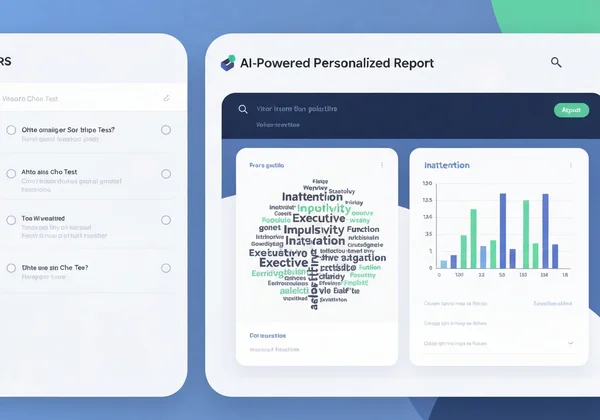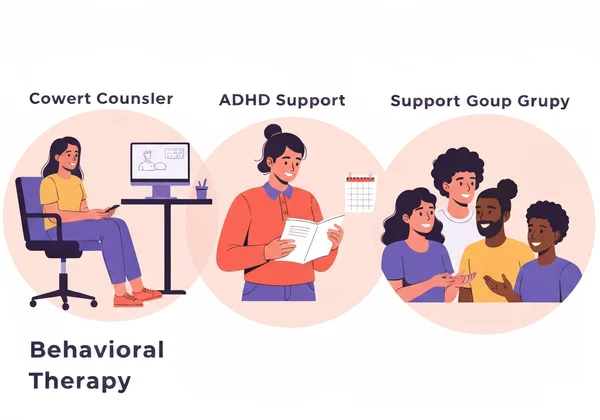ASRS Test: Your Complete Guide to Adult ADHD Diagnosis
November 20, 2025 | By Miles Harrison
Feeling overwhelmed by daily struggles with focus, organization, or motivation? You might be wondering if it's something more than just a character flaw. Do I have ADHD or am I just lazy? This is a question many adults ask themselves in quiet moments of frustration. You are not alone, and seeking clarity is a powerful first step. This guide will walk you through every stage of the adult ADHD diagnosis journey, from initial self-doubt to understanding your options post-diagnosis, empowering you with knowledge and confidence. The path to understanding begins with a single step, and you can take that first step today.
From Self-Doubt to Initial Awareness: Recognizing Adult ADHD Symptoms
The journey often starts with a nagging feeling that you operate differently than your peers. Simple tasks can feel monumental, and staying on track can seem impossible. This isn't a failure of willpower—it's often a matter of neurobiology. Understanding the real symptoms is crucial to moving past self-criticism and toward helpful solutions.
"Am I Just Lazy?" Dispelling Common Myths About Adult ADHD
The word "lazy" is often used to describe struggles that are actually classic signs of executive function challenges common in ADHD. Laziness is a choice to avoid effort, whereas ADHD is a neurodevelopmental condition that makes regulating attention and effort incredibly difficult. Many adults with ADHD describe feeling like they're working twice as hard just to keep up, leading to profound exhaustion and burnout—a far cry from laziness. Recognizing this distinction is the first act of self-compassion on your journey.
Common Symptoms: What Adult ADHD Really Looks Like
Adult ADHD isn't just about hyperactivity; it's a complex condition with a wide range of symptoms that can impact every area of your life. While it presents differently in everyone, some common signs include:
- Inattention: Difficulty sustaining focus, being easily distracted, frequent forgetfulness in daily activities, and trouble organizing tasks.
- Hyperactivity: A feeling of inner restlessness, fidgeting, an inability to stay seated, or talking excessively. In adults, this can be more internal than external.
- Impulsivity: Making hasty decisions without considering long-term consequences, frequently interrupting others, or having trouble waiting your turn.
If these experiences sound familiar, exploring them further with a reliable tool can provide valuable insight.

Your First Step: Utilizing the ASRS Test for Self-Screening
Before scheduling appointments and investing time and money, a preliminary self-assessment can provide a structured look at your symptoms. This is where the Adult ADHD Self-Report Scale (ASRS) becomes an invaluable tool. It’s a scientifically validated questionnaire designed to help you identify potential signs of ADHD based on your own recent experiences.
How the ASRS Test Works: A Quick Overview of the Scale
The ASRS was developed in partnership with the World Health Organization (WHO) and is a trusted screening instrument used by professionals worldwide. It consists of 18 questions that reflect the diagnostic criteria for ADHD in adults. You'll be asked to rate how frequently you've experienced specific symptoms over the past six months. The process is quick, straightforward, and designed to give you a clear, evidence-based snapshot of your current state. You can start your free screening in just a few minutes.
Beyond the Score: Understanding Your Personalized AI Report
Many online tests simply give you a number. At Asrstest, we go a step further. After completing the ASRS, you’ll receive an exclusive, AI-powered personalized report. This report doesn't just tell you if your score is high; it analyzes your unique response patterns to provide deeper insights into your specific challenges, whether they lie in inattention, impulsivity, or a combination of both. This personalized feedback helps you better understand your own mind and prepares you for a more productive conversation with a healthcare professional.

The ASRS: A Stepping Stone, Not a Diagnosis
It is crucial to understand that the ASRS test is a powerful screening tool, not a diagnostic one. A high score suggests that you have symptoms consistent with ADHD and that a professional evaluation is a logical next step. It cannot replace a comprehensive assessment by a qualified clinician. Think of it as the first, empowering piece of data you collect on your journey to clarity. Our confidential ASRS test is the perfect place to begin.
Navigating the Path to Professional Diagnosis for Adults
With the insights from your ASRS report in hand, you'll feel more prepared to seek a formal evaluation. This step can feel daunting, but knowing what to expect can make the process smoother and less intimidating. The goal is to get a complete and accurate picture of your health from a trained expert.
Finding the Right Professional: Who Can Diagnose Adult ADHD?
Several types of healthcare professionals are qualified to diagnose adult ADHD. These include:
- Psychiatrists
- Psychologists
- Neurologists
- Some primary care physicians with specialized training in mental health.
Look for a professional who has specific experience with adult ADHD, as the symptoms can be more nuanced than in children.
Preparing for Your First Appointment: Essential Information to Gather
To make the most of your appointment, gather relevant information beforehand. Your personalized report from our adult ADHD test is an excellent starting point. Additionally, consider compiling:
- A list of the specific symptoms you've been experiencing.
- Examples of how these symptoms affect your work, relationships, and daily life.
- Any relevant personal history, including childhood school reports or feedback from family.
- A list of questions you have for the doctor.
Being prepared helps your doctor understand your situation fully and ensures you get the answers you need.

Life Post-Diagnosis: Embracing Support and Strategies
Receiving a diagnosis can be a life-changing moment filled with a mix of relief, validation, and perhaps some apprehension about what comes next. It’s not an endpoint but a new beginning—a chance to reframe your past struggles and build a more supportive future for yourself.
"Is It Worth Getting an ADHD Diagnosis?" Benefits and Considerations
For many, the answer is a resounding yes. A diagnosis can provide profound validation, confirming that your struggles were not due to a lack of effort. It opens the door to effective treatments and strategies that are specifically designed for the ADHD brain. It allows you to access workplace or academic accommodations and, most importantly, helps you build a stronger sense of self-awareness and self-compassion.
Exploring Treatment Options and Management Strategies
Treatment for adult ADHD is not one-size-fits-all. It's often a multi-faceted approach that may include:
- Behavioral Therapy: Cognitive Behavioral Therapy (CBT) can help you develop practical coping strategies.
- Coaching: An ADHD coach can help with organization, time management, and goal-setting skills.
- Medication: Stimulant and non-stimulant medications can be highly effective for many adults, but this must be discussed with and prescribed by a qualified doctor.
- Lifestyle Adjustments: Changes in diet, exercise, and sleep routines can also provide significant support.
Building Your Support System: Resources and Communities
You don't have to navigate this journey alone. Connecting with others who have ADHD can be incredibly validating. Online forums, local support groups, and communities on social media offer spaces to share experiences and advice. Building a support system of friends, family, and professionals who understand and support you is a key part of thriving with ADHD.

Your Journey to Understanding Adult ADHD Starts Here
The path from self-doubt to self-understanding is a journey, not a race. It begins with asking the right questions and seeking reliable information. Recognizing your symptoms, dispelling myths, and taking a confidential first step with a screening tool are all acts of empowerment. This journey gives you the language to describe your experiences and the knowledge to advocate for your own well-being.
Your journey to clarity starts now. Take our free, confidential ASRS test to receive your personalized AI-powered report. It's the most important first step you can take toward understanding your attention and unlocking your full potential. Visit Asrstest to begin.
Frequently Asked Questions About Adult ADHD Diagnosis
What does ASRS test for?
The ASRS (Adult ADHD Self-Report Scale) is a screening tool designed to assess the presence and severity of attention-deficit/hyperactivity disorder symptoms in adults. It asks about your experiences with inattention, hyperactivity, and impulsivity over the past six months, providing a strong indication of whether a professional evaluation for ADHD is warranted.
How accurate is the ASRS ADHD test?
The ASRS is a highly respected and scientifically validated screening tool. Developed in collaboration with the World Health Organization, it has been shown to have strong reliability and validity in identifying adults who may have ADHD. While it is very accurate for screening purposes, it is not a substitute for a formal diagnosis from a healthcare professional.
What is a positive score on the ASRS assessment?
A "positive" or high score on the ASRS assessment indicates that you have reported a significant number of symptoms consistent with ADHD. This score suggests that your symptoms warrant further investigation. On our platform, you receive more than just a score; our AI-powered report helps interpret these findings, giving you deeper insights to discuss with a doctor. You can discover your results today.
Is it worth getting an ADHD diagnosis?
Absolutely. For many adults, a formal diagnosis is a transformative experience. It provides validation for lifelong struggles, unlocks access to effective treatments and coping strategies, and allows for self-acceptance and a better understanding of how your brain works. It is the foundation for building a life that accommodates and celebrates your unique neurotype.
How to test yourself for ADHD?
The best way to start testing yourself for ADHD is by using a standardized, evidence-based screening tool like the Adult ADHD Self-Report Scale (ASRS). This provides a structured and objective starting point. After self-screening, the next step is to consult with a qualified professional for a comprehensive diagnostic evaluation. To take the first step, you can try our free tool right now.